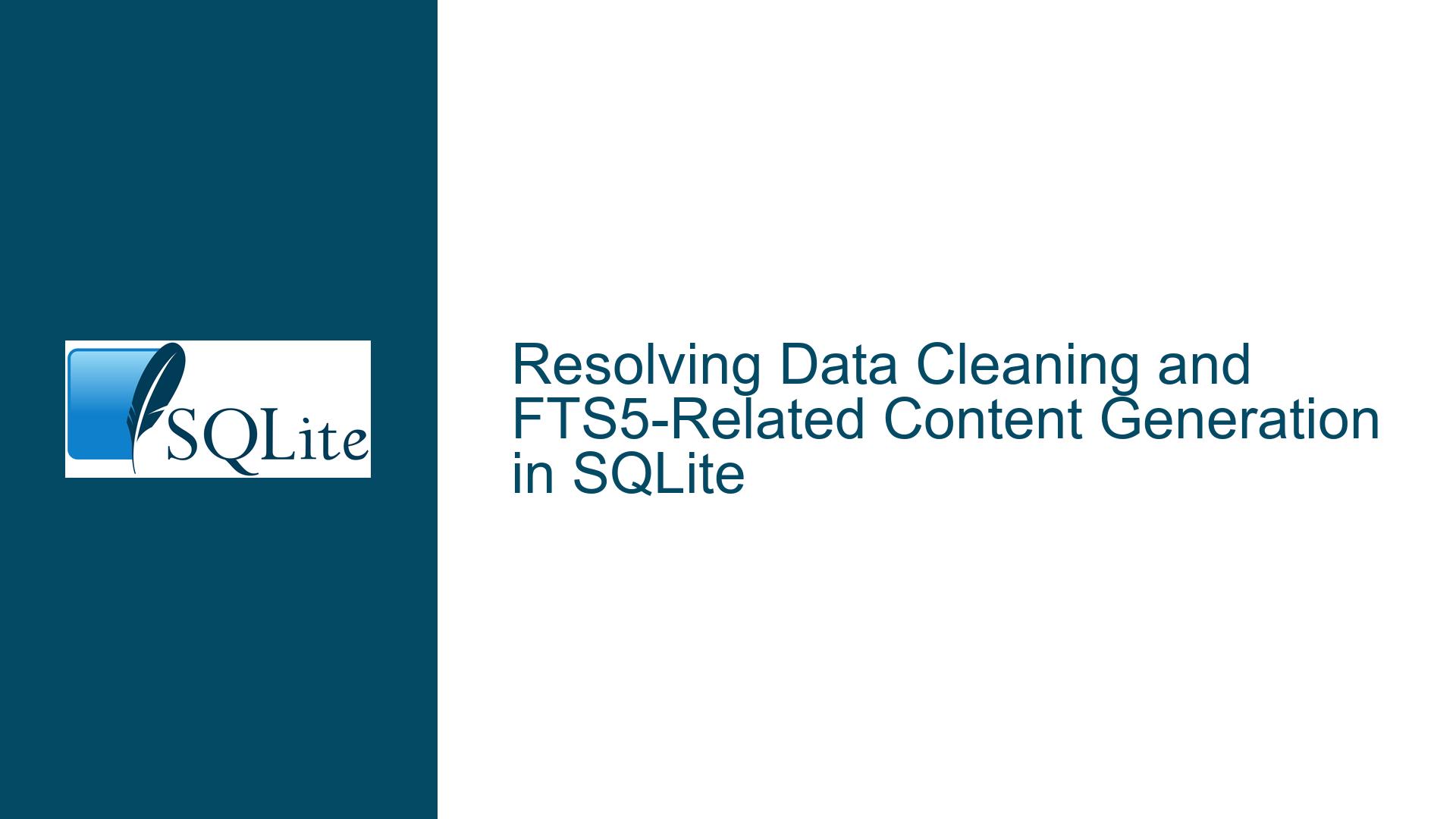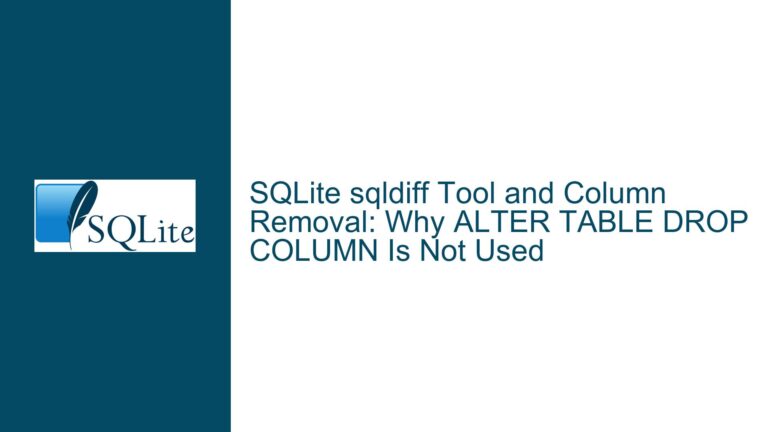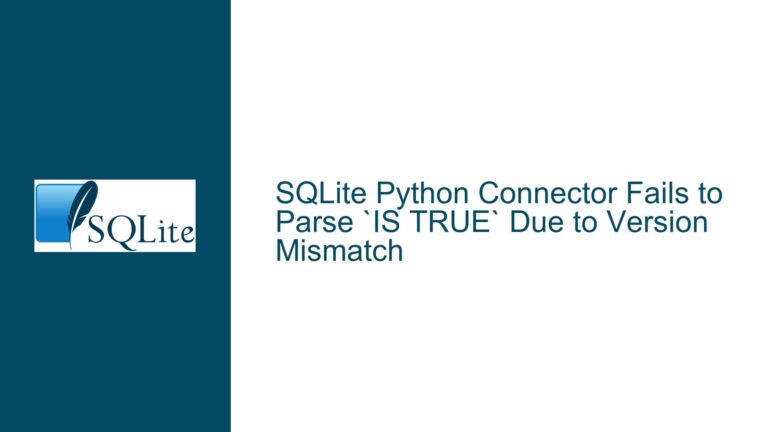Resolving Data Cleaning and FTS5-Related Content Generation in SQLite
Data Import, Schema Modification, and Content Generation Challenges in SQLite
The process of importing CSV data into SQLite, cleaning it through schema modifications and date conversions, and generating related content via FTS5 involves multiple layers of complexity. A comprehensive understanding of SQLite’s capabilities, tooling integrations (like sqlite-utils and Datasette), and data transformation logic is required to execute these tasks efficiently. Challenges arise when raw data exhibits inconsistencies (e.g., non-ISO date formats, unnormalized columns), when schema changes conflict with existing constraints, or when FTS5 queries fail to produce expected related content. These issues often manifest as import errors, constraint violations, incorrect query results, or performance degradation. The root causes span misconfigured tooling commands, inadequate data validation, improper use of SQLite functions, and misunderstandings of FTS5’s tokenization rules. Addressing these requires methodical validation of data pipelines, precise SQL syntax, and strategic indexing.
Causes of CSV Import Failures, Schema Modification Errors, and FTS5 Query Inefficiencies
1. CSV Import Failures Due to Formatting or Tool Misconfiguration
CSV files with irregular delimiters, missing headers, or inconsistent encoding will cause sqlite-utils to misinterpret columns or data types. For example, a CSV containing dates formatted as MM/DD/YYYY may be imported as text strings instead of dates, leading to downstream conversion errors. The sqlite-utils insert command relies on automatic type detection, which fails if numeric fields contain non-numeric characters or if quoted strings include line breaks.
2. Schema Modification Constraints and Data Type Conflicts
Altering a table’s schema to enforce data integrity (e.g., converting a text column to DATE) may fail if existing data does not conform to the target type. A column containing 31/04/2022 (an invalid date) will block ALTER TABLE operations. Similarly, extracting columns into a lookup table without proper foreign key constraints can orphan records or violate referential integrity.
3. Date Conversion Errors from Non-Standard Formats
Raw dates in formats like July 31, 2022 or 20220731 require explicit conversion using SQLite’s strftime or datetime functions. Mismatched format strings (e.g., using %Y-%m-%d on a %d/%m/%Y input) will produce NULL values or incorrect dates. Time zone handling is another pitfall, as SQLite does not store time zones natively.
4. Lookup Table Extraction Without Data Consistency Checks
Splitting a column into a separate table requires deduplication and backfilling foreign keys. If the original column contains variations of the same value (e.g., "New York" and "new york"), the lookup table will create redundant entries unless normalized before extraction.
5. FTS5 Tokenization Misalignment and Query Syntax Errors
FTS5’s default tokenizer splits text into lowercase ASCII terms, ignoring punctuation. Searching for "datasette" will match "Datasette" but not "data-set" unless a custom tokenizer is used. Queries like MATCH 'sqlite AND utils' may fail if the original content uses hyphens or camelCase, as the index stores terms as "sqlite" and "utils" separately.
6. Performance Degradation in Large-Scale Data Operations
Batch-converting millions of date strings or rebuilding FTS5 indexes on large tables without transaction batching can exhaust memory or lock the database. The absence of indexes on lookup table keys or FTS5 external content references leads to full-table scans.
Validating CSV Imports, Enforcing Schema Integrity, and Optimizing FTS5 Queries
1. CSV Import Validation and Correction
Before importing, inspect the CSV’s structure using command-line tools (csvstat, xsv) or text editors. Use sqlite-utils insert --detect-types --csv to infer types, but override them explicitly if needed:
sqlite-utils insert database.db table_name data.csv --csv --detect-types --convert "
def convert(row):
from dateutil.parser import parse
row['date'] = parse(row['date']).isoformat()
return row
"
The --convert option allows Python code to preprocess rows, ensuring dates are parsed correctly. For large files, use --batch-size 1000 to chunk inserts and avoid memory issues.
2. Schema Modification with Data Backfilling
To safely modify a column’s type, create a new table and migrate data with validation:
BEGIN TRANSACTION;
CREATE TABLE new_table (
id INTEGER PRIMARY KEY,
clean_date DATE,
-- other columns...
);
INSERT INTO new_table (id, clean_date, ...)
SELECT id, CASE WHEN date_valid(original_date)
THEN original_date
ELSE NULL
END,
...
FROM old_table;
DROP TABLE old_table;
ALTER TABLE new_table RENAME TO old_table;
COMMIT;
Use date_valid as a custom SQL function (defined via sqlite-utils create-function) to filter invalid dates. For lookup tables, first deduplicate values:
CREATE TABLE lookup AS
SELECT DISTINCT TRIM(LOWER(original_column)) AS normalized FROM main_table;
ALTER TABLE main_table ADD COLUMN lookup_id INTEGER REFERENCES lookup(id);
UPDATE main_table
SET lookup_id = (SELECT id FROM lookup WHERE normalized = TRIM(LOWER(original_column)));
3. Date Conversion Using SQLite Functions
Convert non-ISO dates using strftime and substr in an UPDATE statement:
UPDATE table
SET iso_date = strftime('%Y-%m-%d',
substr(original_date, 7, 4) || '-' ||
substr(original_date, 4, 2) || '-' ||
substr(original_date, 1, 2))
WHERE original_date LIKE '__/__/____';
Handle ambiguous formats by iterating possible patterns in a CASE statement.
4. FTS5 Query Optimization and Tokenization Control
Create an FTS5 table with a custom tokenizer to retain hyphens or camelCase terms:
CREATE VIRTUAL TABLE content_fts USING fts5(
title,
body,
tokenize='porter unicode61 remove_diacritics 2'
);
Use content_fts with the NEAR operator to find proximate terms:
SELECT * FROM content_fts WHERE content_fts MATCH 'sqlite NEAR utils';
For large datasets, use external content tables and triggers to sync changes.
5. Performance Tuning for Bulk Operations
Wrap batch updates in transactions to minimize disk I/O:
BEGIN TRANSACTION;
UPDATE main_table SET lookup_id = ... WHERE ...;
-- Repeat in batches of 10,000 rows
COMMIT;
Create indexes on lookup table IDs and FTS5 external content keys. Use PRAGMA journal_mode = WAL; to enable concurrent reads/writes during long operations.
6. Debugging FTS5 Query Mismatches
Inspect the underlying FTS5 index terms using the fts5vocab virtual table:
SELECT term FROM fts5vocab('content_fts', 'row') WHERE term MATCH 'sqlite*';
This reveals how terms are stored, helping adjust queries or tokenizers.
By systematically addressing each layer of the data pipeline—from import validation to query optimization—these steps ensure robust data cleaning and efficient content generation in SQLite.






